University Analysis: Critical Summary of Emerging Economy MNEs Report
VerifiedAdded on 2022/09/09
|6
|1098
|15
Report
AI Summary
This report provides a critical analysis and summary of the article focusing on Emerging Economy Multinational Enterprises (MNEs) and their internationalization strategies. It examines how MNEs from emerging economies operate and make location choices in advanced economies, departing from traditional models. The analysis highlights the influence of home country munificence, distance between home and host countries, and intellectual property rights on these decisions. The report discusses the challenges and opportunities faced by these MNEs, including competition, resource limitations, and the need to develop specific capabilities. Furthermore, it critiques the article's hypotheses, empirical data, and limitations, offering suggestions for improvement, such as addressing the impact of intellectual property protection on both advanced and emerging economies. The report also summarizes the article's findings, emphasizing the importance of building resource munificence, developing skills, and strategizing to reduce the limitations of MNEs.
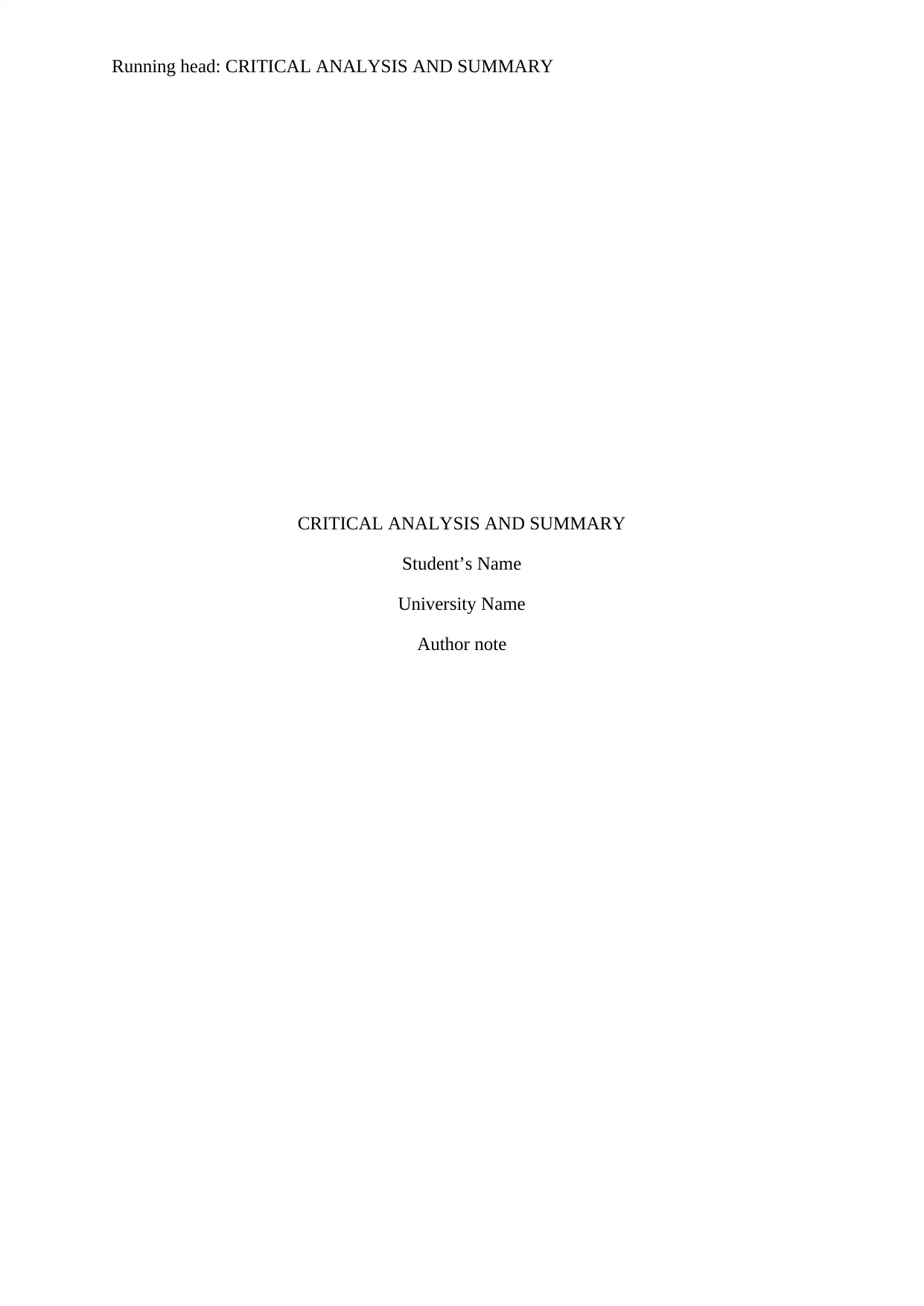
Running head: CRITICAL ANALYSIS AND SUMMARY
CRITICAL ANALYSIS AND SUMMARY
Student’s Name
University Name
Author note
CRITICAL ANALYSIS AND SUMMARY
Student’s Name
University Name
Author note
Paraphrase This Document
Need a fresh take? Get an instant paraphrase of this document with our AI Paraphraser
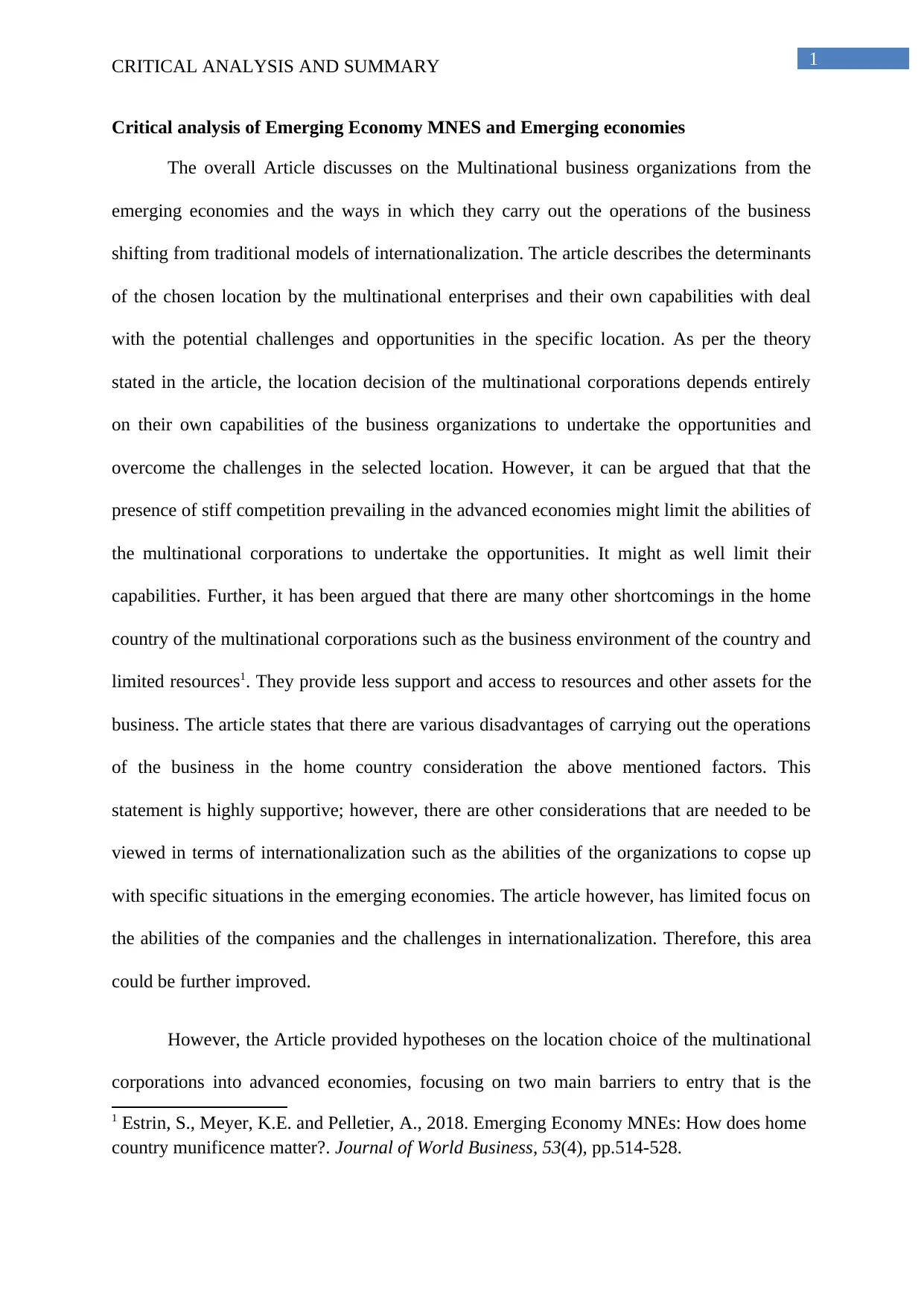
1CRITICAL ANALYSIS AND SUMMARY
Critical analysis of Emerging Economy MNES and Emerging economies
The overall Article discusses on the Multinational business organizations from the
emerging economies and the ways in which they carry out the operations of the business
shifting from traditional models of internationalization. The article describes the determinants
of the chosen location by the multinational enterprises and their own capabilities with deal
with the potential challenges and opportunities in the specific location. As per the theory
stated in the article, the location decision of the multinational corporations depends entirely
on their own capabilities of the business organizations to undertake the opportunities and
overcome the challenges in the selected location. However, it can be argued that that the
presence of stiff competition prevailing in the advanced economies might limit the abilities of
the multinational corporations to undertake the opportunities. It might as well limit their
capabilities. Further, it has been argued that there are many other shortcomings in the home
country of the multinational corporations such as the business environment of the country and
limited resources1. They provide less support and access to resources and other assets for the
business. The article states that there are various disadvantages of carrying out the operations
of the business in the home country consideration the above mentioned factors. This
statement is highly supportive; however, there are other considerations that are needed to be
viewed in terms of internationalization such as the abilities of the organizations to copse up
with specific situations in the emerging economies. The article however, has limited focus on
the abilities of the companies and the challenges in internationalization. Therefore, this area
could be further improved.
However, the Article provided hypotheses on the location choice of the multinational
corporations into advanced economies, focusing on two main barriers to entry that is the
1 Estrin, S., Meyer, K.E. and Pelletier, A., 2018. Emerging Economy MNEs: How does home
country munificence matter?. Journal of World Business, 53(4), pp.514-528.
Critical analysis of Emerging Economy MNES and Emerging economies
The overall Article discusses on the Multinational business organizations from the
emerging economies and the ways in which they carry out the operations of the business
shifting from traditional models of internationalization. The article describes the determinants
of the chosen location by the multinational enterprises and their own capabilities with deal
with the potential challenges and opportunities in the specific location. As per the theory
stated in the article, the location decision of the multinational corporations depends entirely
on their own capabilities of the business organizations to undertake the opportunities and
overcome the challenges in the selected location. However, it can be argued that that the
presence of stiff competition prevailing in the advanced economies might limit the abilities of
the multinational corporations to undertake the opportunities. It might as well limit their
capabilities. Further, it has been argued that there are many other shortcomings in the home
country of the multinational corporations such as the business environment of the country and
limited resources1. They provide less support and access to resources and other assets for the
business. The article states that there are various disadvantages of carrying out the operations
of the business in the home country consideration the above mentioned factors. This
statement is highly supportive; however, there are other considerations that are needed to be
viewed in terms of internationalization such as the abilities of the organizations to copse up
with specific situations in the emerging economies. The article however, has limited focus on
the abilities of the companies and the challenges in internationalization. Therefore, this area
could be further improved.
However, the Article provided hypotheses on the location choice of the multinational
corporations into advanced economies, focusing on two main barriers to entry that is the
1 Estrin, S., Meyer, K.E. and Pelletier, A., 2018. Emerging Economy MNEs: How does home
country munificence matter?. Journal of World Business, 53(4), pp.514-528.
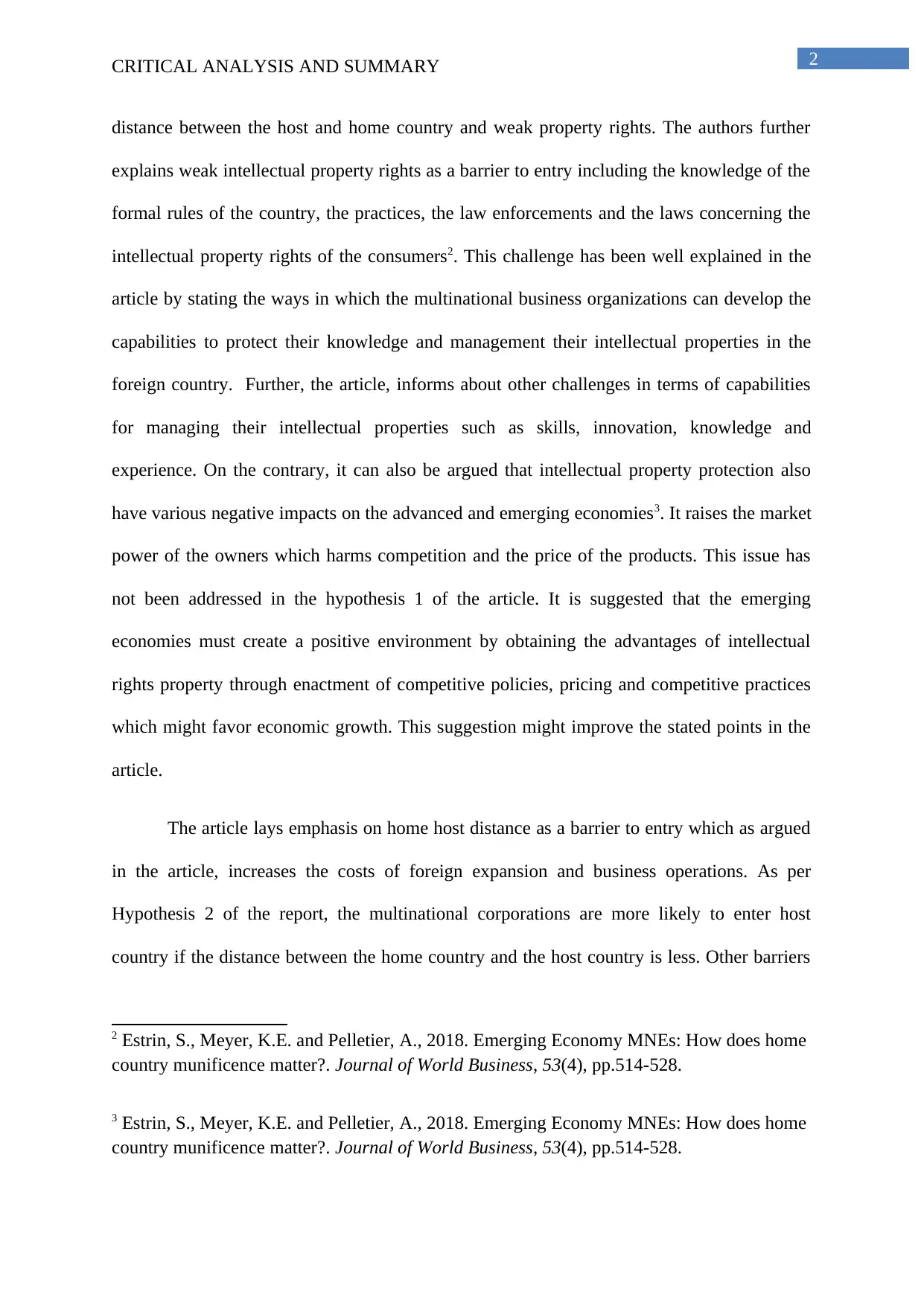
2CRITICAL ANALYSIS AND SUMMARY
distance between the host and home country and weak property rights. The authors further
explains weak intellectual property rights as a barrier to entry including the knowledge of the
formal rules of the country, the practices, the law enforcements and the laws concerning the
intellectual property rights of the consumers2. This challenge has been well explained in the
article by stating the ways in which the multinational business organizations can develop the
capabilities to protect their knowledge and management their intellectual properties in the
foreign country. Further, the article, informs about other challenges in terms of capabilities
for managing their intellectual properties such as skills, innovation, knowledge and
experience. On the contrary, it can also be argued that intellectual property protection also
have various negative impacts on the advanced and emerging economies3. It raises the market
power of the owners which harms competition and the price of the products. This issue has
not been addressed in the hypothesis 1 of the article. It is suggested that the emerging
economies must create a positive environment by obtaining the advantages of intellectual
rights property through enactment of competitive policies, pricing and competitive practices
which might favor economic growth. This suggestion might improve the stated points in the
article.
The article lays emphasis on home host distance as a barrier to entry which as argued
in the article, increases the costs of foreign expansion and business operations. As per
Hypothesis 2 of the report, the multinational corporations are more likely to enter host
country if the distance between the home country and the host country is less. Other barriers
2 Estrin, S., Meyer, K.E. and Pelletier, A., 2018. Emerging Economy MNEs: How does home
country munificence matter?. Journal of World Business, 53(4), pp.514-528.
3 Estrin, S., Meyer, K.E. and Pelletier, A., 2018. Emerging Economy MNEs: How does home
country munificence matter?. Journal of World Business, 53(4), pp.514-528.
distance between the host and home country and weak property rights. The authors further
explains weak intellectual property rights as a barrier to entry including the knowledge of the
formal rules of the country, the practices, the law enforcements and the laws concerning the
intellectual property rights of the consumers2. This challenge has been well explained in the
article by stating the ways in which the multinational business organizations can develop the
capabilities to protect their knowledge and management their intellectual properties in the
foreign country. Further, the article, informs about other challenges in terms of capabilities
for managing their intellectual properties such as skills, innovation, knowledge and
experience. On the contrary, it can also be argued that intellectual property protection also
have various negative impacts on the advanced and emerging economies3. It raises the market
power of the owners which harms competition and the price of the products. This issue has
not been addressed in the hypothesis 1 of the article. It is suggested that the emerging
economies must create a positive environment by obtaining the advantages of intellectual
rights property through enactment of competitive policies, pricing and competitive practices
which might favor economic growth. This suggestion might improve the stated points in the
article.
The article lays emphasis on home host distance as a barrier to entry which as argued
in the article, increases the costs of foreign expansion and business operations. As per
Hypothesis 2 of the report, the multinational corporations are more likely to enter host
country if the distance between the home country and the host country is less. Other barriers
2 Estrin, S., Meyer, K.E. and Pelletier, A., 2018. Emerging Economy MNEs: How does home
country munificence matter?. Journal of World Business, 53(4), pp.514-528.
3 Estrin, S., Meyer, K.E. and Pelletier, A., 2018. Emerging Economy MNEs: How does home
country munificence matter?. Journal of World Business, 53(4), pp.514-528.
⊘ This is a preview!⊘
Do you want full access?
Subscribe today to unlock all pages.

Trusted by 1+ million students worldwide
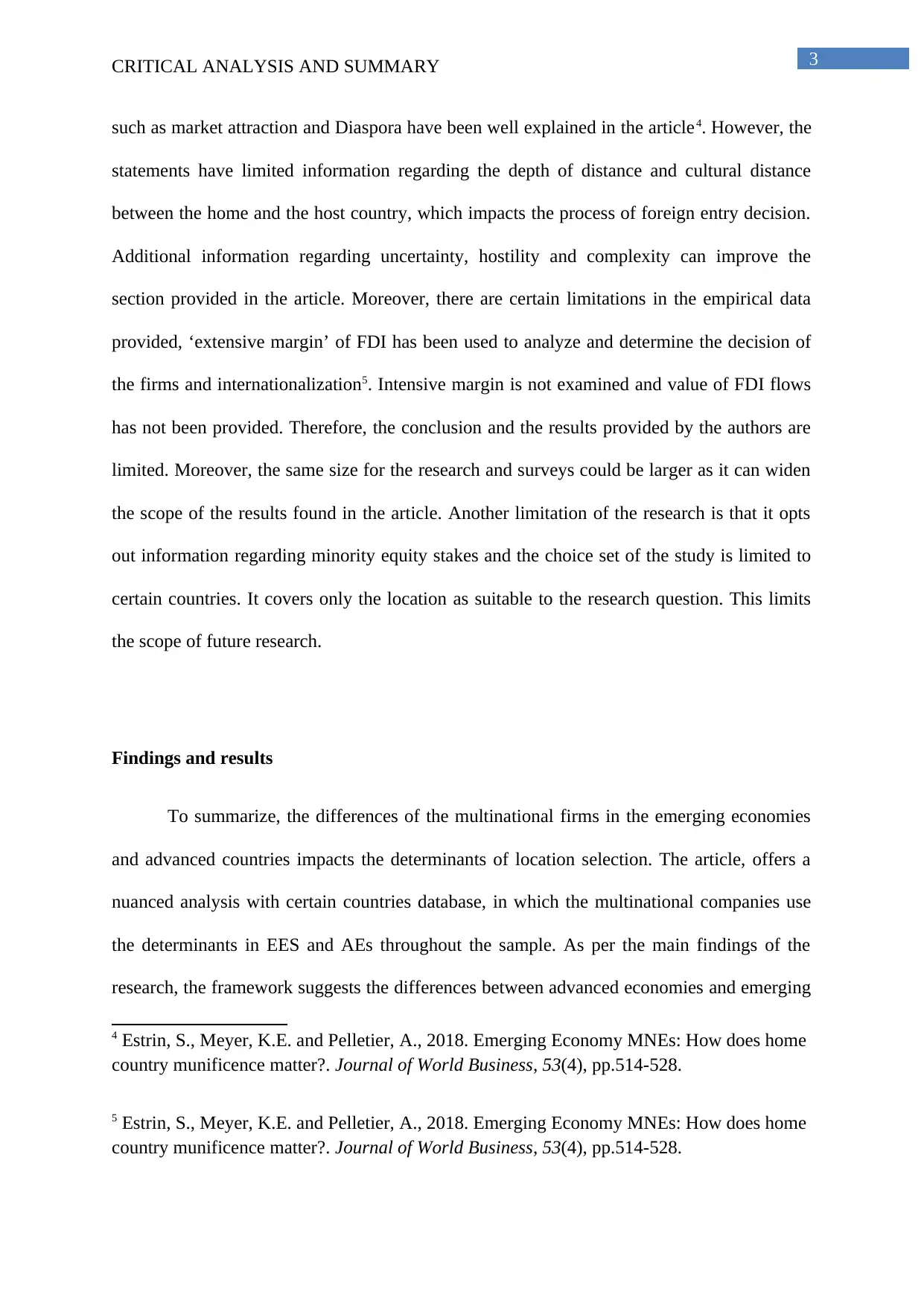
3CRITICAL ANALYSIS AND SUMMARY
such as market attraction and Diaspora have been well explained in the article4. However, the
statements have limited information regarding the depth of distance and cultural distance
between the home and the host country, which impacts the process of foreign entry decision.
Additional information regarding uncertainty, hostility and complexity can improve the
section provided in the article. Moreover, there are certain limitations in the empirical data
provided, ‘extensive margin’ of FDI has been used to analyze and determine the decision of
the firms and internationalization5. Intensive margin is not examined and value of FDI flows
has not been provided. Therefore, the conclusion and the results provided by the authors are
limited. Moreover, the same size for the research and surveys could be larger as it can widen
the scope of the results found in the article. Another limitation of the research is that it opts
out information regarding minority equity stakes and the choice set of the study is limited to
certain countries. It covers only the location as suitable to the research question. This limits
the scope of future research.
Findings and results
To summarize, the differences of the multinational firms in the emerging economies
and advanced countries impacts the determinants of location selection. The article, offers a
nuanced analysis with certain countries database, in which the multinational companies use
the determinants in EES and AEs throughout the sample. As per the main findings of the
research, the framework suggests the differences between advanced economies and emerging
4 Estrin, S., Meyer, K.E. and Pelletier, A., 2018. Emerging Economy MNEs: How does home
country munificence matter?. Journal of World Business, 53(4), pp.514-528.
5 Estrin, S., Meyer, K.E. and Pelletier, A., 2018. Emerging Economy MNEs: How does home
country munificence matter?. Journal of World Business, 53(4), pp.514-528.
such as market attraction and Diaspora have been well explained in the article4. However, the
statements have limited information regarding the depth of distance and cultural distance
between the home and the host country, which impacts the process of foreign entry decision.
Additional information regarding uncertainty, hostility and complexity can improve the
section provided in the article. Moreover, there are certain limitations in the empirical data
provided, ‘extensive margin’ of FDI has been used to analyze and determine the decision of
the firms and internationalization5. Intensive margin is not examined and value of FDI flows
has not been provided. Therefore, the conclusion and the results provided by the authors are
limited. Moreover, the same size for the research and surveys could be larger as it can widen
the scope of the results found in the article. Another limitation of the research is that it opts
out information regarding minority equity stakes and the choice set of the study is limited to
certain countries. It covers only the location as suitable to the research question. This limits
the scope of future research.
Findings and results
To summarize, the differences of the multinational firms in the emerging economies
and advanced countries impacts the determinants of location selection. The article, offers a
nuanced analysis with certain countries database, in which the multinational companies use
the determinants in EES and AEs throughout the sample. As per the main findings of the
research, the framework suggests the differences between advanced economies and emerging
4 Estrin, S., Meyer, K.E. and Pelletier, A., 2018. Emerging Economy MNEs: How does home
country munificence matter?. Journal of World Business, 53(4), pp.514-528.
5 Estrin, S., Meyer, K.E. and Pelletier, A., 2018. Emerging Economy MNEs: How does home
country munificence matter?. Journal of World Business, 53(4), pp.514-528.
Paraphrase This Document
Need a fresh take? Get an instant paraphrase of this document with our AI Paraphraser
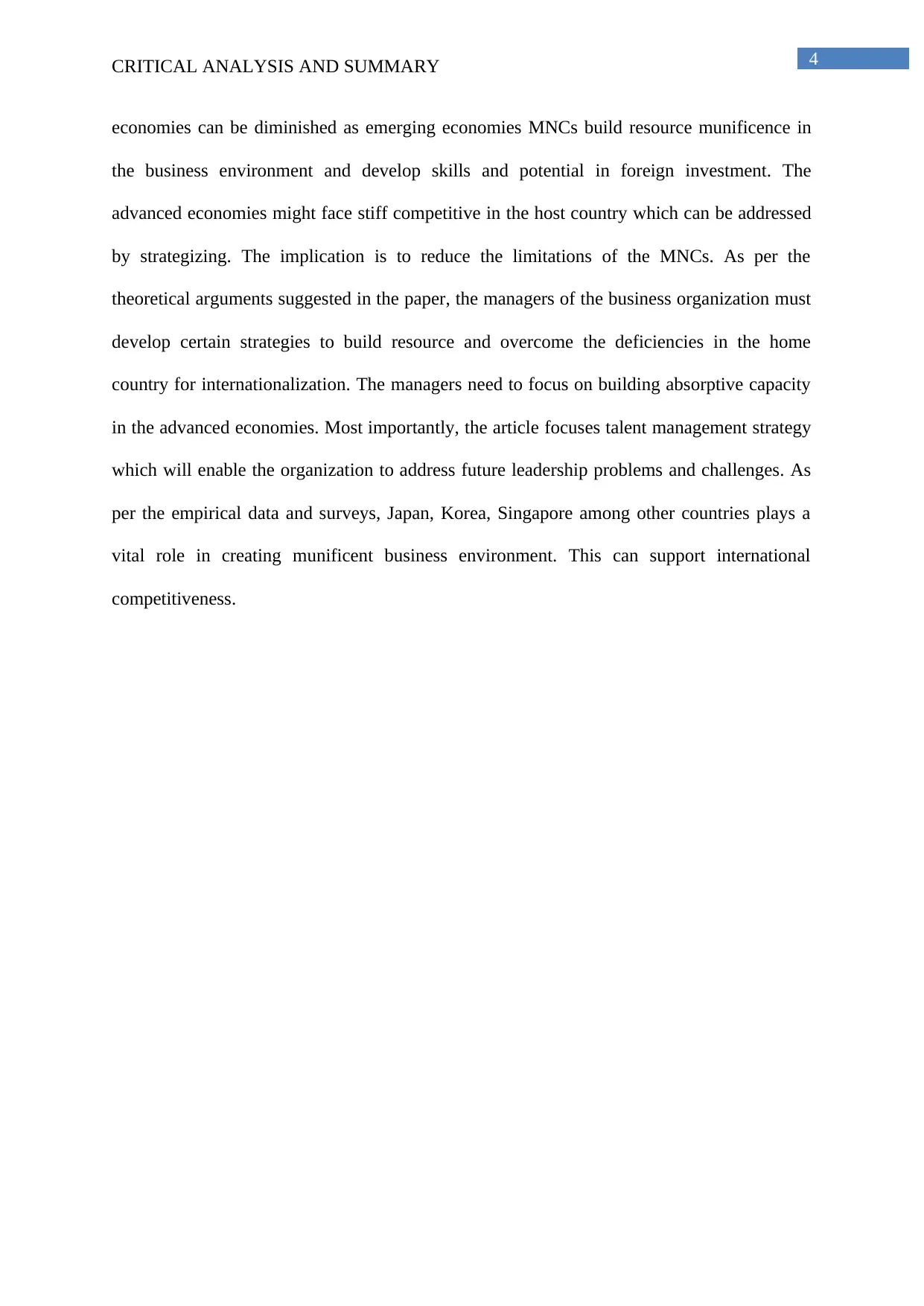
4CRITICAL ANALYSIS AND SUMMARY
economies can be diminished as emerging economies MNCs build resource munificence in
the business environment and develop skills and potential in foreign investment. The
advanced economies might face stiff competitive in the host country which can be addressed
by strategizing. The implication is to reduce the limitations of the MNCs. As per the
theoretical arguments suggested in the paper, the managers of the business organization must
develop certain strategies to build resource and overcome the deficiencies in the home
country for internationalization. The managers need to focus on building absorptive capacity
in the advanced economies. Most importantly, the article focuses talent management strategy
which will enable the organization to address future leadership problems and challenges. As
per the empirical data and surveys, Japan, Korea, Singapore among other countries plays a
vital role in creating munificent business environment. This can support international
competitiveness.
economies can be diminished as emerging economies MNCs build resource munificence in
the business environment and develop skills and potential in foreign investment. The
advanced economies might face stiff competitive in the host country which can be addressed
by strategizing. The implication is to reduce the limitations of the MNCs. As per the
theoretical arguments suggested in the paper, the managers of the business organization must
develop certain strategies to build resource and overcome the deficiencies in the home
country for internationalization. The managers need to focus on building absorptive capacity
in the advanced economies. Most importantly, the article focuses talent management strategy
which will enable the organization to address future leadership problems and challenges. As
per the empirical data and surveys, Japan, Korea, Singapore among other countries plays a
vital role in creating munificent business environment. This can support international
competitiveness.
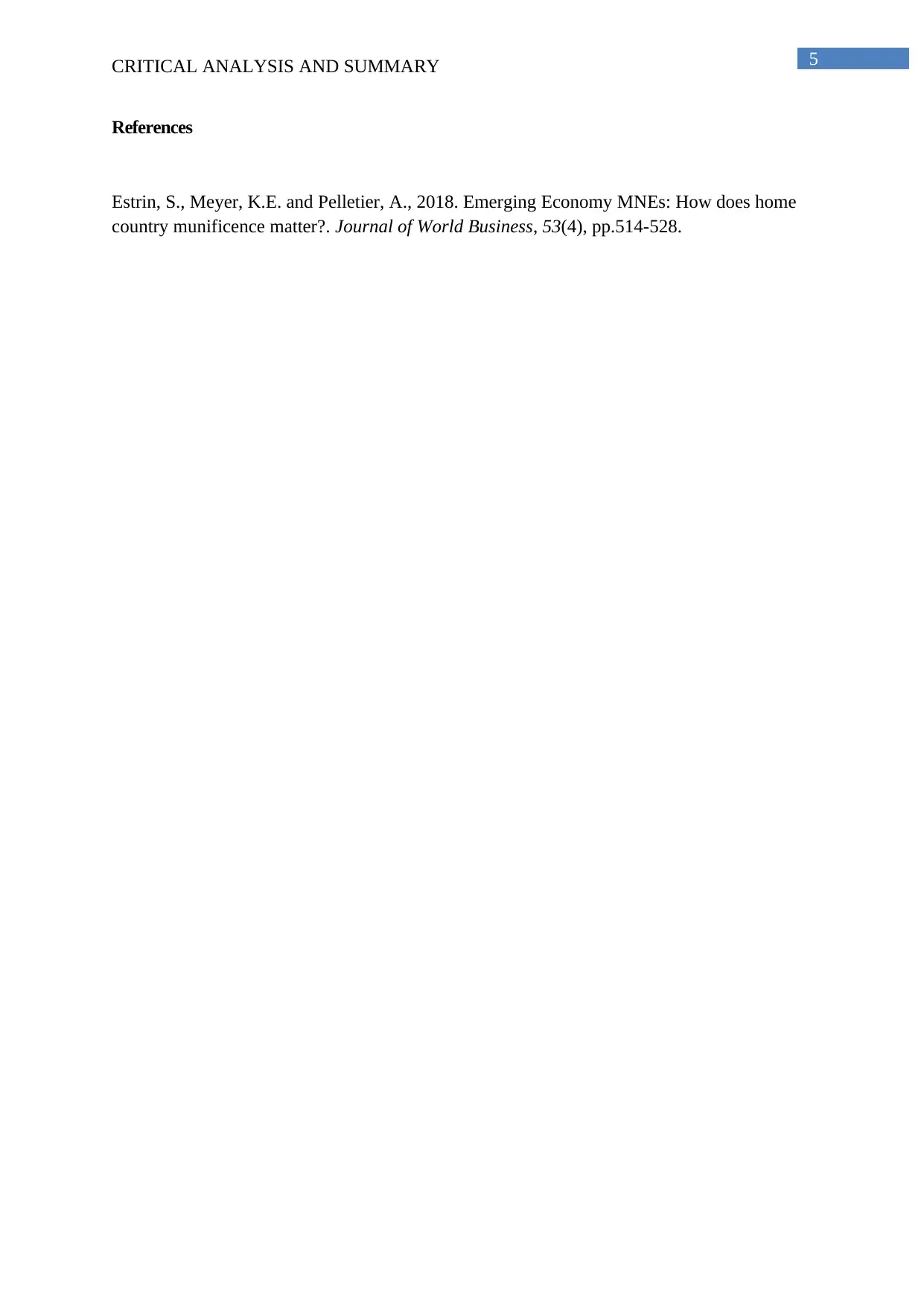
5CRITICAL ANALYSIS AND SUMMARY
References
Estrin, S., Meyer, K.E. and Pelletier, A., 2018. Emerging Economy MNEs: How does home
country munificence matter?. Journal of World Business, 53(4), pp.514-528.
References
Estrin, S., Meyer, K.E. and Pelletier, A., 2018. Emerging Economy MNEs: How does home
country munificence matter?. Journal of World Business, 53(4), pp.514-528.
⊘ This is a preview!⊘
Do you want full access?
Subscribe today to unlock all pages.

Trusted by 1+ million students worldwide
1 out of 6
Related Documents
Your All-in-One AI-Powered Toolkit for Academic Success.
+13062052269
info@desklib.com
Available 24*7 on WhatsApp / Email
![[object Object]](/_next/static/media/star-bottom.7253800d.svg)
Unlock your academic potential
Copyright © 2020–2025 A2Z Services. All Rights Reserved. Developed and managed by ZUCOL.





